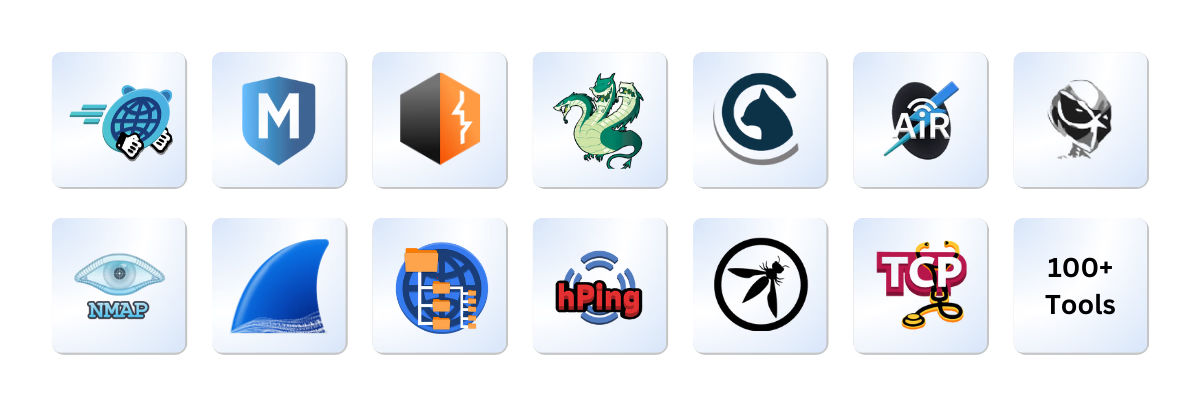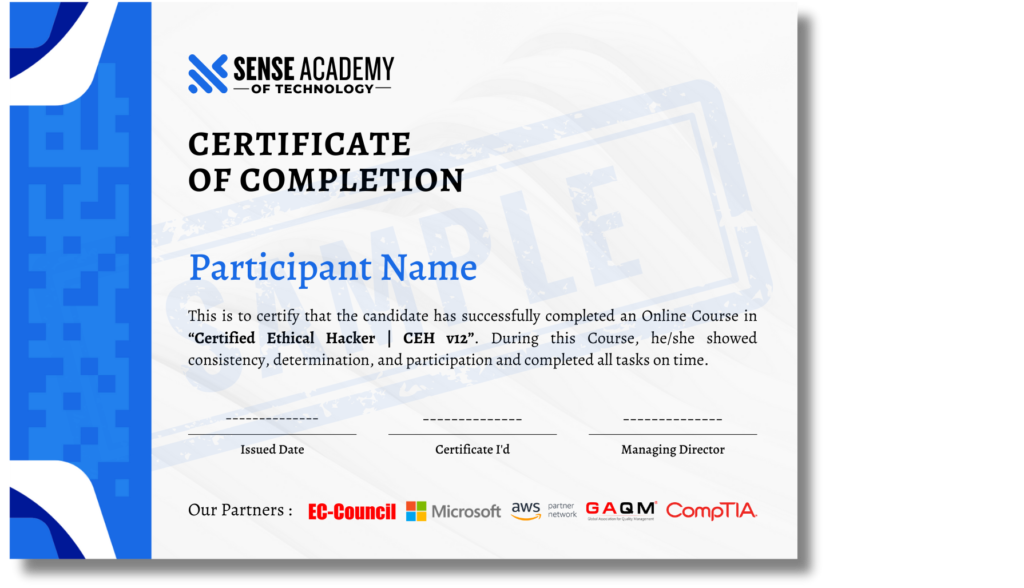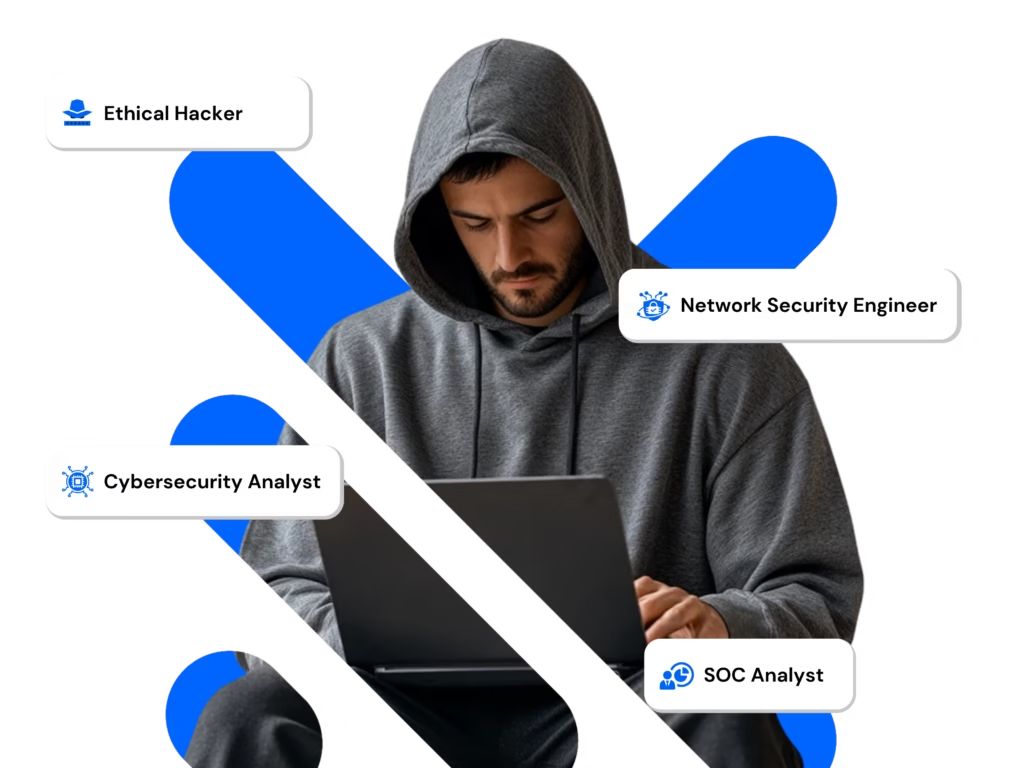CEH V13 Certification With
AI Training
Certified Ethical Hacker
- Highly interactive CEH Training provided by industry leaders
- The latest CEH v13 Course Content to help you master all domains of CEH
- Our CEH Course highlights the promise of 98% Pass Rate
- CEH Course benefits learners across the globe with career transformations
- Train Your Team:
Accredited By

Program Overview
Senseacademy offers the best ethical hacking course in Dehradun with the EC-Council’s Certified Ethical Hacker (CEH v13) training program. This advanced certification equips professionals with the skills to identify, understand, and counter cyber threats, vulnerabilities, and attack techniques in today’s IT landscape.
Our ethical hacking course in Dehradun integrates AI-driven strategies to strengthen cybersecurity defenses, enabling ethical hackers to detect and mitigate threats with greater accuracy and speed. Designed to meet the demands of over 45 cybersecurity job roles, the CEH v13 curriculum ensures that participants gain industry-relevant expertise, making them job-ready for various positions in the cybersecurity sector.
If you’re searching for the best ethical hacker course or the best ethical hacking training, Senseacademy provides top-notch instruction, hands-on labs, and expert mentorship to help you excel in the field of cybersecurity.
- 40-Hour LIVE Instructor-led Training
- EC-Council Authorized Partner
- Practical Training on Latest Tools
- 98% Exam Pass Rate
- Learn from CEI Certified Trainers
- Career Guidance and Mentorship
Learning Schedule
Senseacademy Corporate Training Features
-
Customized Course Delivery
Flexible selection Model Tailor-Made for Your Needs -
Insights into Learning
Modified Dashboard to Envision Training Progress -
Cloud-based Work Enviroment
Hands-On Experience on Sense Academy Cloud Lab, Pre-Configured to Get Started Directly. -
24×7 Supports
Continuous Support from In-House Subject-Matter Experts -
Qualifications
Industry-Recognized Certification to Enhance Your Workforce.
Fill The Form Below
Senseacademy 1 on 1 Training Features
-
Flexible Scheduling
On-demand learning and personalized timelines based on availability. -
Focus on Problem-Solving
Ability to address specific work-related challenges or projects during the training. -
Interactive and Hands-On Approach
Practical, hands-on learning through real-world scenarios relevant to the learner’s industry. -
Real-Time Feedback & Mentorship
Direct, one-on-one interaction with expert trainers. -
Certifications and Skill Validation
Upon completion, learners may receive certifications validating their skills, adding value to their professional profile.
Fill The Form Below
Need Help Finding the Right Schedule?
Connect with Our Training Advisor!
About Course
The Certified Ethical Hacker (CEH v13) training program at Senseacademy is the best ethical hacking course in Dehradun, designed to equip professionals with vital skills for excelling in ethical hacking and cybersecurity. This latest version integrates AI-driven technologies and advanced methodologies, enhancing both the learning experience and the effectiveness of ethical hacking techniques.
Participants enrolling in our ethical hacking course in Dehradun will gain hands-on experience through interactive labs, realistic simulations, and innovative AI-based tools. This comprehensive approach enables them to master ethical hacking practices and develop essential cybersecurity skills to counter both conventional threats and emerging AI-enhanced attacks.
Join Senseacademy’s CEH v13 training today and become a certified ethical hacker with industry-relevant expertise!
Tools Covered in the CEH v13 Course at Senseacademy

Modules
Module 1
- Introduction to Ethical Hacking
- Information Security Overview
- Hacking Concepts
- Ethical Hacking Concepts
- Hacking Methodologies and Frameworks
- Information Security Controls
- Information Security Laws and Standards
Module 2
- Footprinting and Reconnaissance
- Footprinting Concepts
- Footprinting through Search Engines
- Footprinting through Internet Research Services
- Footprinting through Social Networking Sites
- Who is Footprinting?
- DNS Footprinting
- Network and Email Footprinting
- Footprinting through Social Engineering
- Footprinting Tasks using Advanced Tools and AI
- Footprinting Countermeasures
Module 3
- Scanning Networks
- Network Scanning Concepts
- Scanning Tools
- Host Discovery
- Port and Service Discovery
- OS Discovery (Banner Grabbing/OS Fingerprinting)
- Scanning Beyond IDS and Firewall
- Source Port Manipulation
- Network Scanning Countermeasures
Module 4
- Enumeration
- Enumeration Concepts
- NetBIOS Enumeration
- SNMP Enumeration
- LDAP Enumeration
- NTP and NFS Enumeration
- SMTP and DNS Enumeration
- Other Enumeration Techniques
- Enumeration Countermeasures
Module 5
- Vulnerability Analysis
- Vulnerability Assessment Concepts
- Vulnerability Scoring Systems and Databases
- Vulnerability-Management Life Cycle
- Vulnerability Research
- Vulnerability Scanning and Analysis
- Vulnerability Assessment Tools
- Vulnerability Assessment Reports
Module 6
- System Hacking
- Gaining Access
- Escalating Privileges
- Maintaining Access
- Clearing Logs
Module 7
- Malware Threats
- Malware Concepts
- APT Concepts
- Trojan Concepts
- Viruses and Worms
- Fileless Malware Concepts
- AI-based Malware Concepts
- Malware Countermeasures
- Anti-Malware Software
Module 8
- Sniffing
- Sniffing Concepts
- Sniffing Technique
- Sniffing Tools
- Sniffing Countermeasures
Module 9
- Social Engineering
- Social Engineering Concepts
- Human-based Social Engineering Techniques
- Computer-based Social Engineering Techniques
- Mobile-based Social Engineering Techniques
- Social Engineering Countermeasures
Module 10
- Denial-of-Service
- DoS/DDoS Concepts
- Botnets
- DDoS Case Study
- DoS/DDoS Attack Techniques
- DoS/DDoS Attack Countermeasures
Module 11
- Session Hijacking
- Session Hijacking Concepts
- Application-Level Session Hijacking
- Network-Level Session Hijacking
- Session Hijacking Tools
- Session Hijacking Countermeasures
Module 12
- Evading IDS, Firewalls, and Honeypots
- Intrusion Detection/Prevention System (IDS/IPS) Concepts
- Firewall Concepts
- IDS, IPS, and Firewall Solutions
- Evading IDS/Firewalls
- Evading NAC and Endpoint Security
- IDS/Firewall Evading Tools
- Honeypot Concepts
- IDS/Firewall Evasion Countermeasures
Module 13
- Hacking Web Servers
- Web Server Concepts
- Web Server Attacks
- Web Server Attack Methodology
- Web Server Attack Countermeasures
- Patch Management
Module 14
- Hacking Web Applications
- Web Application Concepts
- Web Application Threats
- Web Application Hacking Methodology
- Web API and Webhooks
- Web Application Security
Module 15
- SQL Injections
- SQL Injection Concepts
- Types of SQL Injection
- SQL Injection Methodology
- Evasion Techniques
- SQL Injection Countermeasures
Module 16
- Hacking Wireless Networks
- Wireless Concepts
- Wireless Encryption
- Wireless Threats
- Wireless Hacking Methodology
- Wireless Attack Countermeasures
Module 17
- Hacking Mobile Platforms
- Mobile Platform Attack Vectors
- Hacking Android OS
- Hacking iOS
- Mobile Device Management
- Mobile Security Guidelines
- Mobile Security Tools
Module 18
- IoT Hacking & OT Hacking
- IoT Hacking
- IoT Concepts and Attacks
- IoT Hacking Methodology
- OT Hacking
Module 19
- Cloud Computing
- Cloud Computing Concepts
- Container Technology
- Serverless Computing
- Cloud Hacking
- Cloud Hacking Methodology
- AWS Hacking
- Microsoft Azure Hacking
- Google Cloud Hacking
- Container Hacking
- Cloud Security
Module 20
- Cryptography
- Cryptography Concepts and Encryption Algorithms
- Applications of Cryptography
- Cryptanalysis
- Cryptography Attack Countermeasures
Target Audience
- Ethical Hackers
- Security Analysts
- Network and Security Engineers
- Cybersecurity Managers
- Information Security Auditors
- Security Specialists
Pre-requisites
- Fundamental knowledge of networking basics
- Core understanding of network concepts
- Familiarity with server architecture
- Awareness of essential network components
Exam Information
| Certification Code | 312-50 (ECC EXAM), 312-50 (VUE) |
| Exam Format | Multiple Choices |
| Question Count | 125 |
| Delivery Method | ECC EXAM, VUE |
| Exam Duration | 4 Hours |
Course Objectives
- Introduction to ethical hacking, cyber kills chain concepts, and AI-powered threat detection and response for strengthened security measures.
- Footprinting fundamentals, including AI-driven tools for automated information gathering and reconnaissance.
- Vulnerability assessment techniques, categories, and industry-relevant, AI-enhanced technologies for exposure identification.
- Social engineering concepts such as identity theft, impersonation, insider threats, and AI-supported strategies to counteract social engineering.
- Essentials of Operational Technology (OT) and IoT security, covering threat identification, attack methodologies, and AI-based defenses for robust protection.
Skills Covered
- Defense strategies against Trojans and backdoors.
- Advanced security practices for mobile and web platforms.
- AI-powered network traffic analysis for proactive threat detection.
- Enhanced vulnerability scanning and exploitation using AI tools.
- Phishing identification and prevention methods.
- Comprehensive cloud security solutions and continuous monitoring.
- Cyber threat intelligence gathering and response planning.
Enroll For This Course
How We Help You Succeed

Insight

Target

Skill Mastery

Guidence

Assistance

Navigation

Accomplishment
Power of Words

Rohit Sharma
Senseacademy transformed my career with comprehensive courses and knowledgeable instructors. Highly recommend!
- PMI

Priya Nair
Senseacademy offers great value. The IT training significantly boosted my skills and confidence. Thank you Senseacademy!
- Machine learning

Anjali Varma
My experience with Senseacademy was excellent. The up-to-date curriculum and hands-on projects made concepts clear.
- Data Science

Amitabh Singh
I appreciate Senseacademy’s practical approach. Real-world scenarios and case studies enriched the learning experience.
- UI/UX Knowledge

Vikram Patel
Senseacademy’s flexible online courses let me learn at my own pace, and the support team is very responsive and helpful.
- Web Development

Kavita Deshmukh
I completed a fantastic web development course at Senseacademy. The passionate instructors provided excellent guidance.
- Business Marketing
Frequently Asked Questions
At Senseacademy, we offer comprehensive support during the best ethical hacking course in Dehradun. This includes:
- Expert-led training with certified instructors
- Hands-on labs for real-world experience
- AI-driven tools to enhance learning
- Placement assistance to help students secure cybersecurity jobs
- Doubt-clearing sessions and 24/7 access to study material
After completing our ethical hacking course in Dehradun, you can explore career roles such as:
- Ethical Hacker
- Cybersecurity Analyst
- Penetration Tester
- Security Consultant
- Incident Responder
This best ethical hacker course prepares you for 45+ cybersecurity job roles, making you industry-ready.
professionals.
You can easily register for the CEH course on our website or by contacting our training advisors. At Senseacademy, we also offer flexible payment plans and special discounts for group enrolments.
After completing the CEH course at Senseacademy, you can pursue roles like Ethical Hacker, Security Analyst, Penetration Tester, IT Security Consultant, and more. The demand for cybersecurity professionals continues to grow, and CEH certification will significantly boost your employability.
Yes! Senseacademy offers both online and offline options for the best ethical hacking course in Dehradun. Our live instructor-led online sessions provide the same interactive learning experience as our classroom training.
If you’re looking for the best ethical hacking training near me, join Senseacademy today and kickstart your career in cybersecurity!







